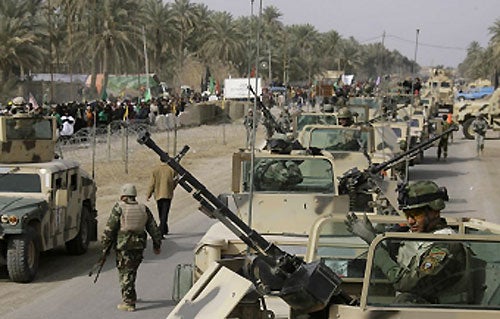Pilgrims killed as al-Qa'ida resume Iraq attacks

Your support helps us to tell the story
From reproductive rights to climate change to Big Tech, The Independent is on the ground when the story is developing. Whether it's investigating the financials of Elon Musk's pro-Trump PAC or producing our latest documentary, 'The A Word', which shines a light on the American women fighting for reproductive rights, we know how important it is to parse out the facts from the messaging.
At such a critical moment in US history, we need reporters on the ground. Your donation allows us to keep sending journalists to speak to both sides of the story.
The Independent is trusted by Americans across the entire political spectrum. And unlike many other quality news outlets, we choose not to lock Americans out of our reporting and analysis with paywalls. We believe quality journalism should be available to everyone, paid for by those who can afford it.
Your support makes all the difference.A suicide bomber detonated an explosive belt in a tent filled with Shia pilgrims walking to one of their holiest shrines south of Baghdad, killing at least 40 of them and wounding 60.
The attack shows that al-Qa'ida has restarted its bombings of Shia Iraqis, whom it sees as heretics, and remains capable of launching numerous suicide attacks on the same day in different parts of Iraq.
The claim by the US military of a significant drop in violence in Iraq is being dented by a rise in sectarian killings and by the Turkish invasion of Iraqi Kurdistan last Thursday in pursuit of Turkish Kurd PKK guerrillas.
People taking part in the traditional Arbain procession to Kerbala, commemorating the 40th day of mourning after the martyrdom of Imam Hussein in AD680, had stopped at a refreshment tent near the town of Iskandariyah 30 miles south of Baghdad. As the pilgrims ate and drank a bomb exploded, spraying metal ball bearings in all directions.
"When we reached the area people invited us into a tent to take some rest and have some food," said Um Hamr, a woman injured by the blast. "When we entered, there was a huge ball of fire and we saw people lying on the ground."
A local official Saleh al-Massoudi said: "The blast devastated the entire tent, which was about 20 metres long and four metres wide."
Earlier gunmen attacked pilgrims with machine guns and grenades as they walked past the Sunni district of Dora in south Baghdad, killing three and wounding 36 of them. Though 40,000 police have been mobilised the millions of pilgrims are impossible to protect.
The explosion, coming after two suicide bombers killed 99 people in two bird markets in Shia areas of Baghdad on 1 February, bears all the hall marks an al-Qa'ida attack. If Shia civilians continue to be targeted then the Shia militias may resume tit-for-tat killings of Sunni, reigniting the Shia-Sunni civil war of 2006 and early 2007. Al-Qaida was seriously weakened by a Sunni backlash last year led by al-Sahwa, the Awakening Councils made up of guerrillas previously fighting the American forces. But there are growing signs that al-Qa'ida has reorganised and is still able to recruit and equip many suicide bombers.
Three men wearing suicide belts stormed a checkpoint at Saqlawiyah, 45 miles west of Baghdad on Saturday, killing Sheikh Ibrahim Mutayri al-Mohamaday, the local leader of al-Sahwa.
In northern Iraq Turkish soldiers and PKK – Kurdistan Workers' Party – rebels are continuing to fight in the mountains in the largest Turkish offensive into Iraq in a decade. The PKK says it shot down a Turkish Cobra helicopter. The loss is admitted by the Turkish military though it does not say how the aircraft was lost. Turkey's general staff says that 15 Turkish soldiers and 115 guerrillas have been killed so far. The PKK claims that 47 Turkish troops and two rebels have died.
"The bombings are continuing by land and air, the clashes are becoming heavier," a Turkish military source said. Twenty-five more tanks have been sent to the region. A senior Turkish officer said that two brigades of 8,000 men were taking part.
The Turkish Prime Minister Recep Tayyip Erdogan is to send a special envoy to Baghdad this week to discuss the incursion. He will not meet the Iraqi Prime Minister Nouri al-Maliki who is in London for a check up on his heart. Turkey refuses to talk to the Kurdistan Regional Government (KRG).
The inability of the government in Baghdad and its US supporters to prevent the Turkish army invading northern Iraq at will is damaging to their authority. The Turkish invasion is probably doing more damage to the KRG than it is to the PKK, whose 2,500 fighters in the area can take refuge in deep valleys and hidden bunkers. The repeated Turkish attacks are fast eroding confidence in the future stability of Iraqi Kurdistan.
Join our commenting forum
Join thought-provoking conversations, follow other Independent readers and see their replies
Comments